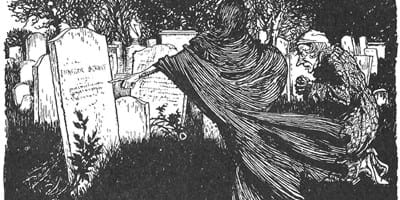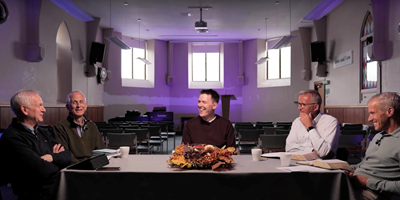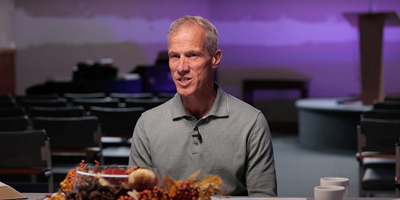Being in England, we have always celebrated on the Saturday following Thanksgiving, and each year we invite friends or family to join us. One of our traditions is to make specific time for each person gathered around the spread to share reasons to be thankful. Of course, thankfulness should not be relegated to one day of the year. It ought to be our default position every day of the year. However, having a tradition helps us to do what we ought to do, and reminds us of how thankless we so often are.
This thanklessness is magnified when we turn to Scripture, for we are not only reminded that there are many things to be thankful for each day, but exhorted to be thankful in every situation. “In everything give thanks, for this is the will of God in Christ Jesus for you” (1 Thessalonians 5:18).
As we sit down for our Thanksgiving meal this year, we will again share reasons to be thankful. If you’re anything like me, in your mind you’ll be trawling through all the great things that have happened through the year. Reason for thankfulness indeed. I want, however, to challenge you this year to consider the less than great times, perhaps even the tragedies that have blown across your path, and to ask the question: is it possible even to be thankful for the trials?
The verse quoted above is telling us that “in Christ Jesus” it is. The reason for this is that “in Christ Jesus” we come to have a much bigger perspective on life. Indeed, we come to have an eternal perspective grounded in an eternal God, whose purpose and plans ultimately “work together for good” that “the justified” would be “glorified” (Romans 8:28-30).
First Thanksgiving
The story that led to the very first Thanksgiving bears this out. I’m thinking particularly of the story of Tisquantum, or Squanto: a character central to the survival and establishing of the Mayflower pilgrims at Plymouth Rock.
We pick up his story in 1614, six years before the pilgrims would arrive, and Squanto is introduced to us on a slave ship bound for Spain. He boarded the ship with goods to trade, trusting the English who had arrived offshore from where his Patuxet tribe lived. Deplorably, his trust was betrayed, and he was taken to be sold as a slave in Malaga. Shortly thereafter, he was ransomed by local friars and given his freedom; he then journeyed to London. Some years passed. We’re not sure what his status was, though we know he lived with a merchant, John Slanie, and was likely in his employ. Finally, after a few attempts, Squanto was able to return to his homeland, only to find that disease had wiped out his tribe. The Patuxet were no more. He was alone. What was there to be thankful for?
It is at this low point – March 1621 – that the remaining pilgrims and crew wearily leave the Mayflower to set up Plymouth Colony. There were only around seventy of them left, about half of the number that set out. It had been a hard winter, and more dangers and difficulties lay ahead. There seemed little to be thankful about, but God was in control and already had a man in place, prepared and ready to help. This was Squanto.
Squanto was first introduced to the pilgrims as a mediator. Having learnt English in London, Squanto was able to act as translator and intermediary between the pilgrims and the neighbouring chieftain, Massasoit. Having made peace, Squanto then remained with the pilgrims, developing a close friendship with their leader, William Bradford. He was able to teach them where to hunt and how to farm the land, so they had a bountiful harvest. Bradford wrote that Squanto was “a special instrument sent of God for their good beyond their expectation”.[1]
We cannot know how things would have turned out if the tragedies in Squanto’s life had not happened. But certainly, we can see that, because of them, Squanto was uniquely fitted to play a pivotal role in bringing unity between peoples of differing cultures and through this a growing affinity and prosperity. For this, the pilgrims were especially thankful, and Bradford wrote of an occasion after the harvest when they “might after a more special manner rejoice together”. This was not the Thanksgiving meal that we’ve come to love, but a time of recreation spent with neighbouring chief Massasoit and many of his men.
It's important to note that it was only with hindsight the pilgrims gained a more rounded perspective on the whole thing. It was only at the end that they saw God’s provision in the midst of the trials and were thankful. We can learn from this, and choose to give thanks while the suffering is ongoing, trusting that the same God already has His Man in place for us; a man prepared and ready to help. This Man, though, is no ordinary man, but the Son of God. His name is Jesus Christ.
Thanksgiving Forever
He, too, has suffered that we might have peace. The Bible tells us that “to reconcile all things to Himself” He “made peace through the blood of His cross” (Colossians 1:20). This verse tells us something of God’s purpose and provision. It is God’s desire that we, who are naturally “alienated” and “enemies” (v.21)] of our Creator, would be reconciled in peace to Him – what grace! To accomplish this He sent His Son to walk a path of suffering, and ultimately, to die – what love! It is only in this way that the Son would be fitted to be the Saviour. The Bible again tells us that “though He was a Son, yet He learned obedience by the things which He suffered. And having been perfected, He became the author of eternal salvation to all who obey Him” (Hebrews 5:8,9).
The amazing thing is that while Squanto’s preparatory journey of suffering was forced upon him, and beyond his control, for our Lord Jesus Christ, His journey was willingly undertaken in love, knowing the blessed end it would bring (Hebrews 12:2). That blessing can only be experienced when, like the pilgrims with Squanto, we recognise the singular role that Christ must play. We must recognise our need as sinners, and give Him the place of pre-eminence that the Saviour alone deserves, in faith proclaiming that “Jesus Christ is Lord”.
The pilgrims were blessed by the continuing presence of Squanto. As he taught and guided them, they observed, obeyed, and enjoyed a plentiful harvest as a result. Similarly, the pathway to spiritual blessing for the Christian is simple obedience to Christ. In Philippians 2, immediately following the proclamation of Jesus as Lord, Paul encourages the believers who “have always obeyed”, to continue to “do all things without complaining and disputing”, knowing that “it is God who works in you both to will and to do for His good pleasure” (Philippians 2:12-14).
Just as the story of the first thanksgiving ended in rejoicing, so we as Christians can live out the exhortations of 1 Thessalonians 5:16-18. First, we can look back and “Rejoice always” in the finished work of Christ. And when the trials and tragedies of life come upon us, we have recourse to look up and “pray without ceasing”, for the risen Saviour is on the throne. Finally, we ought to look forward with that eternal perspective of assured glory, and “in everything give thanks”.
[1] Of Plymouth Plantation, Morison (ed.), 1952.

































